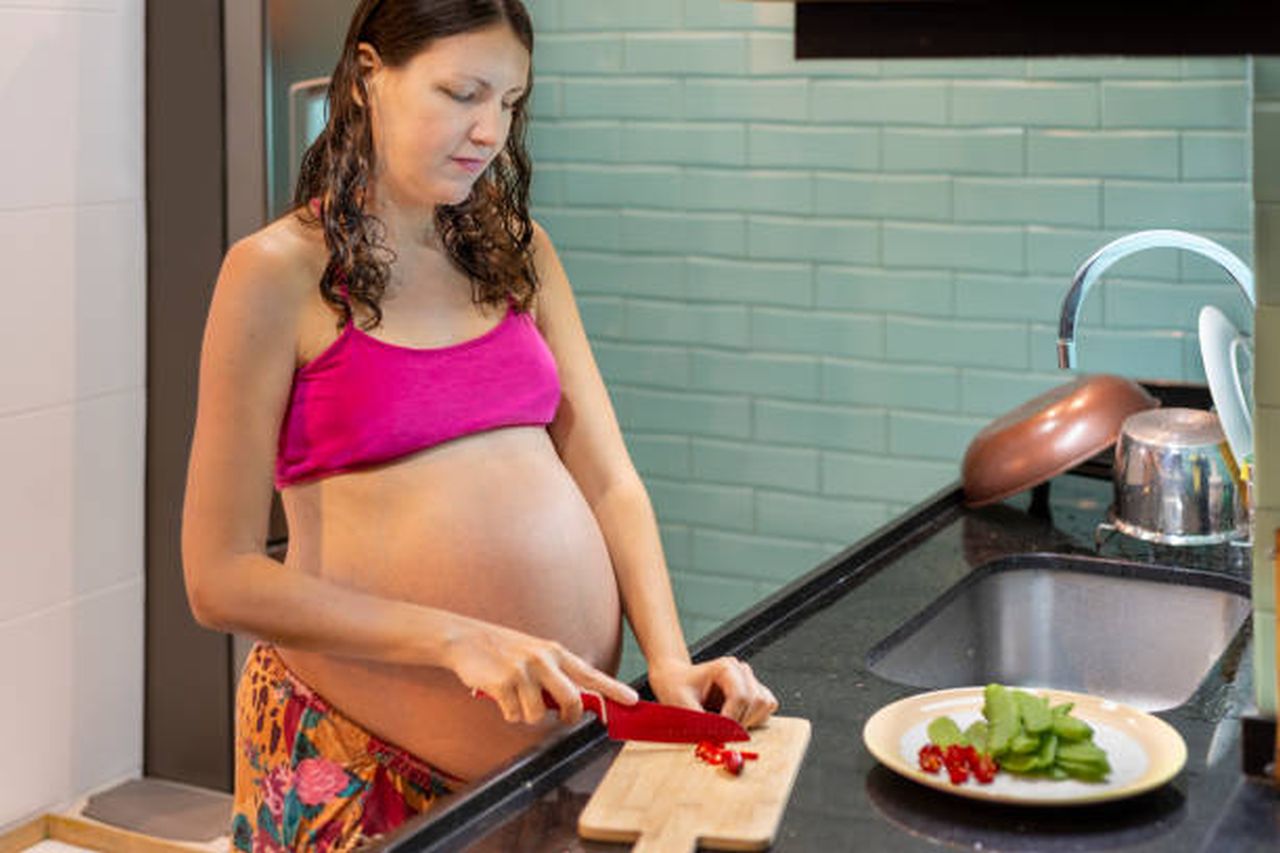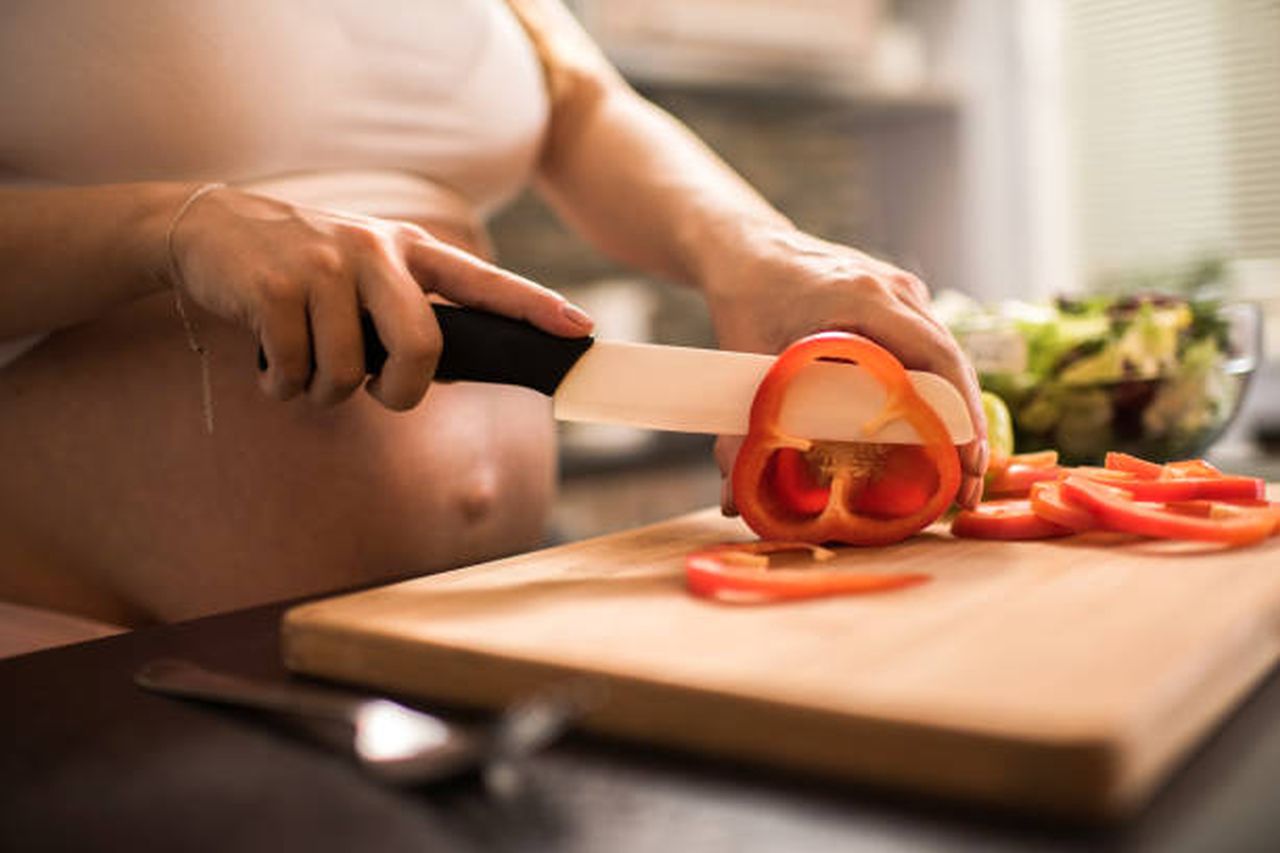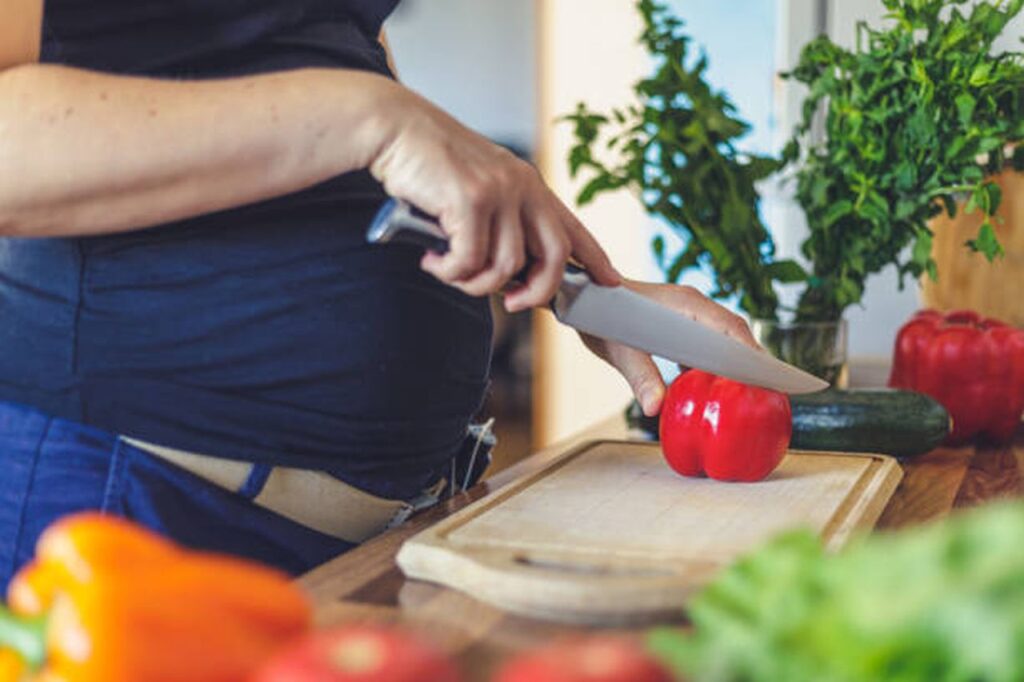The previous level of your tolerance for spicy foods was probably somewhere around medium. Now that you're expecting a baby, though, you can't stop thinking about buffalo wings, roasted cauliflower, and buffalo potato chips.
The mother and the developing child both benefit from the mother's nutrition during pregnancy.
Because of the importance of a healthy pregnancy diet to the development of the unborn child.
All necessary precautions must be taken to guarantee that no potentially harmful substances are present.
What you need to know if you're pregnant and finding yourself pouring spicy sauce on nearly everything (just your breakfast cereal is safe now).
What Does It Mean If I Have a Craving for Spicy Foods?
During pregnancy, you may find yourself craving strange and unusual foods.
A pregnant woman has probably eaten pickles and ice cream, strawberry jam on hamburgers, marinara sauce on canned tuna, and perhaps more bizarre combinations than that.
Hormones are to blame for everything, therefore there's really just one explanation.
Many pregnant women have a strong need for spicy foods, but there is no secret to understanding this craving.
Some believe it's a sign that you're having a boy, while others question whether it's an innate need to cool down (hot food causes you to perspire, which in turn reduces your body temperature).
No need to panic if you find yourself desiring five-alarm chilli because your taste senses have changed during pregnancy. It's hardly likely to be a portent of anything significant.
Is it Safe to Eat Spicy Food While Pregnant?
There is no need to avoid spicy meals during pregnancy because they are perfectly safe. Nonetheless, these are not among the many things you should avoid eating while pregnant.
Many people have the (incorrect) assumption that consuming spicy food is unhealthy at any time, but especially while pregnant.
That's not how things work! Although your taste buds and stomach may not always be able to handle the heat, spicy meals are perfectly safe to eat.
If you're pregnant and spicy foods make your stomach hurt, it's probably best to avoid them.
Effects During Each Trimester
While eating spicy food may make morning sickness worse, it probably won't create any other problems in the first trimester.
Spicy meals may exacerbate morning sickness and nausea if you're already feeling ill throughout the day.
Eating spicy food in the second and third trimesters of pregnancy may cause:
- Heartburn, caused by the increased pressure of the uterus on the stomach and oesophagus.
- Indigestion
- Nausea
- Stomach cramps, nausea, and diarrhoea
- Symptoms of gastroesophageal reflux disease (GERD) worsen
Eating Spicy Foods During the First Trimester
Spicy food can be eaten without worry throughout the first trimester of pregnancy.
First-trimester miscarriage rates are high, therefore expectant mums may be wary of the implications of eating spicy food.
Eating Spicy Foods During the Second and Third Trimesters
When eaten throughout the second and third trimesters of pregnancy, spicy foods increase the likelihood of developing heartburn and acid reflux.
Spicy meals may make it worse when the pregnant woman's growing foetus causes stomach acids to flow back into the oesophagus in the third trimester.
Browse our wide selection of baby crib mattresses here at My Baby Nursery.
How Much Spicy Food Is Safe To Eat
Spicing up your diet in moderation is fine as long as your digestive system can handle the heat.
Don't eat anything too hot that was prepared in the open. To prevent any heavy metal and colour additives, it's best to buy whole spices and ground them at home.
Are Spicy Foods Safe for Baby?
The good news is that eating spicy food while pregnant poses no risk to the unborn child. Really! Your baby is safe from harm.
Warning: studies published in 2019 reveal that the "flavour" of your amniotic fluid can be affected by what you eat while pregnant.
However, there are no available studies that focus on the consumption of spicy foods.
But if you feed your kid a lot of spicy foods, like buffalo chicken wraps, they may come to favour those over other flavours. That's not to say that it's a negative thing, but just so you know.
When Pregnant, Is It Safe to Eat Spicy Food?
The bad news is that while consuming a lot of spicy food won't harm your kid, it can make you sick.
Nothing to worry about, however the satisfaction of a craving may always be worth a little discomfort in the digestive system.
You should take it easy on the chilli peppers if you're not used to eating them, but your pregnancy has given you a yearning for them.
Avoid eating spicy meals frequently or in large quantities. Be careful to drink plenty of water instead. When preparing hot foods, it is important to use high-quality ingredients and to wash one's hands thoroughly after working with peppers.
Don't immediately reach for the ghost pepper tabasco with the skull and crossbones on the label; instead, work on increasing your tolerance to heat over time.
How Does Consuming Spicy Foods During Pregnancy Affect You?
Both you and your unborn child can benefit and suffer from eating spicy food while pregnant. Hot and spicy cuisines have the potential to:
Raised the Possibility of Experiencing Heartburn
Spicy foods, especially when consumed late in pregnancy, can aggravate heartburn, which is prevalent during pregnancy. In addition, the baby's weight can cause stomach acids to rise into the esophagus as the infant gets bigger.
Many expectant mothers experience heartburn, which may be made worse by eating spicy foods.
Hormonal changes during pregnancy cause heartburn by relaxing the valve between the esophagus and the stomach, which allows stomach acids to reflux into the esophagus.
In the third trimester, when your baby is expanding and pressing on your stomach, acid from the stomach can back up into your esophagus, causing heartburn.

Allergies
For some expecting mothers, eating pepper can trigger unpleasant allergic reactions. Pregnancy is not the time to try to overcome the odds if you have ever experienced allergy issues.
Trigger Abdominal Pain
Intestinal ulcers are not brought on by spicy foods (in fact, capsaicin – the chemical that gives peppers a bite – may even help heal ulcers).
However, those who suffer from Crohn's disease or ulcerative colitis may find that eating spicy meals brings on an attack of their symptoms.
Improve Your Health In All Ways
Capsaicin, the active ingredient in peppers, can reduce inflammation. Spicy foods may even help your immune system and your heart, according to several studies.
Develop Your (Future) Child's Palate by Introducing New Foods
Your kid will take in whatever you eat while you are pregnant. Amniotic fluid acts as a conduit for the transmission of flavours from the mother's diet to the developing foetus.
At week 15, your baby's taste buds are fully grown and she is swallowing amniotic fluid, so she is probably already tasting your meals.
Since what you eat has been shown to affect your baby's taste preferences, introducing new flavours and spices to your diet before birth may help foster a more adventurous eater.
While Pregnant, Why Do I Have a Sudden Urge for Spicy Food?
Certain foods are craved by as much as 90% of pregnant women.
There are various hypotheses as to why, exactly, pregnant women prefer spicy foods (or any foods at all).
Hormonal shifts during pregnancy have been linked to an increased sensitivity to odours and flavours.
However, your environment and culture are probably more influential factors in your appetites. Japanese people, say researchers, are more likely to crave rice than chocolate.
One such idea that has little chance of being true is that cravings are signs of dietary deficiencies. Pregnant ladies would prefer broccoli and beans if that were the truth.
Should I Eat Spicy Food To Induce Labor?
While many women claim that eating spicy meals helped them go into labour, scientific data supports this claim.
It has been shown that very few of the supposed natural methods for inducing labour work.
Spicy food may stimulate digestion and lead to contractions, according to one theory.
Others argue that eating spicy foods helps speed up labour by increasing the body's synthesis of prostaglandins.
Although modest uterine discomfort may be triggered by prostaglandins released during an upset stomach or diarrhoea, this is not likely to be enough to bring on labour.
Eating spicy foods was one of fifty factors connected to labour in a research that polled 663 women.
The vast majority of pregnant women report being unable to identify a single event or action that initiated labour. Acupuncture was the only form of encouragement shown to have any kind of statistically significant effect on any of the ladies.
Choosing the best nursing chair for your child's room is essential. You may find a variety of high-quality options for nursing chairs at My Baby Nursery.
Do Spicy Foods Really Speed Up Labor?
Everyone from your mum to your grandma to the guy in the next apartment over will undoubtedly encourage you to eat something spicy if you're nearing the end of your pregnancy and considering inducing labour.
This piece of advice is so common that it was included in a 2011 study on labour saving strategies alongside things like walking, sex, and laxatives.
Researchers polled 201 postpartum women about their experiences with natural labour induction, and found that 50% had attempted self-induction; of these, 20% reported eating hot foods to bring on labour.
It's just that. This is not supported by any scientific evidence.
Eating a plate of wings won't make your body ready for birth if you're already comfortable at 38 weeks along and haven't started dilation yet.
FAQS About Pregnancy
Fenugreek seed consumption has a negative impact on the uterus, hence it is not advised for pregnant women to take it. It can result in bloating, acid reflux, gas, and diarrhoea. Fenugreek seeds can also slow down a child's growth when taken in extremely large.
Eating spicy foods during pregnancy is generally safe for both you and your baby. However, while there are no threats to you or your baby, spicy foods may cause some uncomfortable side effects for pregnant women, including heartburn and indigestion.
In fact, many women experience strong cravings for hot, spicy foods during pregnancy. These cravings can be caused by fluctuating pregnancy hormones which can play with your sense of taste and smell.
Spicy food can irritate your intestines, much like castor oil (albeit more gently), which may cause cramping and uterine contractions for women who are already dilated. That said, there's no evidence to support the theory that spicy food induces labor.
Cultures have been feeding babies the same spicy food adults eat for a long while. There's no reason to think that something spicy would be harmful to an infant any more than an adult.
Common Misconceptions About Eating Spicy Food While Pregnant
The consumption of spicy foods during pregnancy is often misunderstood. Such unsubstantiated beliefs are:
- Eating spicy food when pregnant can be dangerous.
- In some cases, eating spicy food can cause labour to begin prematurely.
- Spicy food consumption during pregnancy is associated with an increased risk of miscarriage and congenital abnormalities.
These false beliefs have zero basis in fact and should be disregarded as such.
Additional Precautions
Indulging in spicy foods may be worth the accompanying heartburn if it means satisfying a strong appetite, but remember that relieving pregnancy heartburn isn't as simple as chugging Pepto-Bismol like it was before pregnancy.
Common OTC medications for nausea and vomiting during pregnancy are not universally accepted as safe. You should contact your doctor if you have any of the following gastrointestinal (GI) symptoms that are severe or persistent:
- Cramping
- Diarrhea
- Burning pain
- Bloating
- Gas
Ways to Enjoy Spicy Food Safely
You can avoid the risks associated with eating spicy food by following these guidelines.
- Spices should be bought under a recognised brand and certified safe for human consumption.
- Spices supplied in bulk may contain unwanted substances, such as brick powder, and should not be consumed.
- Incorporate new spices into your diet gradually. It's ideal to get whole fresh herbs and ground them at home.
- Before you buy spices from a store, make sure to inspect the packaging and use-by dates.
- If spicy Indian cuisine gives you heartburn, try keeping your spicy intake to one dish per meal or switching to a less inflammatory cuisine.
- Eat more meals at home, where you have more control over the ingredients and the amount of seasonings.

Dietary Guidelines for Those Who Enjoy Spicy Food
Being careful and picky about the spicy foods you eat while pregnant can assist. You can add some heat to your diet with these foods:
- Wasabi Peas are spicy and crunchy and completely harmless to your health.
- Curry sauce is a staple in Indian cooking and is made by combining several spices with onion, garlic, and chilli peppers.
- The primary component of Piri-Piri Sauce is the "super-hot African bird's eye chilli," which is combined with other spices and ingredients like onion, garlic, and tomato.
- Sweet sauces based on black onion seeds, green chillies, tomato, and coriander are a staple of Middle Eastern cooking.
Pickles and Sauces
- The spicy pickles you can find at any convenience shop are a safe way to satisfy your appetite for heat without compromising your health.
- When you have a cold due to a lack of immunity, try a soup made with pepper. Pepper is safe to use in pregnancy due to its antimicrobial and spicy characteristics.
Making your own sauce at home is preferable since it allows you to control the amount of spices and oils used, both of which can trigger heartburn if consumed in excess.
Hormonal Imbalance Caused by Hot and Spicy Food
Generally speaking, pregnant women can eat spicy food without fear of harm. However, some women may experience discomfort if they consume too much spice or have a particularly sensitive digestive system.
Spicy foods may aggravate preexisting conditions in some women, such as a sensitive uterus or stomach. Foods high in capsaicin or capsicum acids and/or volatile sulphur compounds (which can produce bloating, gas, and diarrhoea) are often digested more rapidly than other types of food.
Due to its close proximity to the intestines, the uterus might be irritated by these cramps in the intestines.
An irritable uterus is characterised by uncontrolled twitching of the uterine muscles or cramping in the lower abdomen, which may, in extreme situations, lead to contractions that start to dilate the cervix.
If a pregnant woman is less than 37 weeks along and experiencing any of these symptoms, she should see a doctor promptly for further guidance.
Spicy foods should be avoided during pregnancy if they cause symptoms like heartburn, bloating, or cramps.
Conclusion
Many pregnant women have a strong need for spicy foods, but there is no secret to understanding this craving. There is no need to avoid spicy meals during pregnancy because they are perfectly safe. Eating spicy food may make morning sickness worse, but it probably won't create any other problems in the first trimester. Eating spicy food while pregnant poses no risk to the unborn child. Spicy foods increase the likelihood of developing heartburn and acid reflux in the second and third trimesters of pregnancy.
Eating spicy meals frequently or in large quantities can make you sick, so avoid it! Many expectant mothers experience heartburn, which may be made worse by eating spicy foods. Intestinal ulcers are not brought on by spicy foods (in fact, capsaicin – the chemical that gives peppers a bite – may even help heal ulcers). Some who suffer from Crohn's disease or ulcerative colitis may find that eating spicy meals brings on an attack of their symptoms. Spicy food may stimulate digestion and lead to contractions, according to one theory.
Some argue that eating spicy foods helps speed up labour by increasing the body's synthesis of prostaglandins. This is not supported by any scientific evidence. Eating a plate of wings won't make your body ready for birth if you're 38 weeks along. Spicy foods may be worth indulging in during pregnancy if it means satisfying a strong appetite. But remember that relieving pregnancy heartburn isn't as simple as chugging Pepto-Bismol like before.
You can avoid the risks associated with eating spicy food by following these guidelines. Spicy foods should be avoided during pregnancy if they cause symptoms like heartburn or cramps. Foods high in capsaicin or capsicum acids and/or volatile sulphur compounds (which can produce bloating, gas, and diarrhoea) are often digested more rapidly than other types of food.
Content Summary
- The previous level of your tolerance for spicy foods was probably somewhere around medium.
- The mother and the developing child both benefit from the mother's nutrition during pregnancy.
- Because of the importance of a healthy pregnancy diet to the development of the unborn child.
- During pregnancy, you may find yourself craving strange and unusual foods.
- Many pregnant women have a strong need for spicy foods, but there is no secret to understanding this craving.
- There is no need to avoid spicy meals during pregnancy because they are perfectly safe.
- Nonetheless, these are not among the many things you should avoid eating while pregnant.
- Many people have the (incorrect) assumption that consuming spicy food is unhealthy at any time, but especially while pregnant.
- Although your taste buds and stomach may not always be able to handle the heat, spicy meals are perfectly safe to eat.
- If you're pregnant and spicy foods make your stomach hurt, it's probably best to avoid them.
- Spicy food can be eaten without worry throughout the first trimester of pregnancy.
- When eaten throughout the second and third trimesters of pregnancy, spicy foods increase the likelihood of developing heartburn and acid reflux.
- The good news is that eating spicy food while pregnant poses no risk to the unborn child.
- Warning: studies published in 2019 reveal that the "flavour" of your amniotic fluid can be affected by what you eat while pregnant.
- However, there are no available studies that focus on the consumption of spicy foods.
- But if you feed your kid a lot of spicy foods, like buffalo chicken wraps, they may come to favour those over other flavours.
- The bad news is that while consuming a lot of spicy food won't harm your kid, it can make you sick.
- You should take it easy on the chilli peppers if you're not used to eating them, but your pregnancy has given you a yearning for them.
- Both you and your unborn child can benefit and suffer from eating spicy food while pregnant.
- Spicy foods, especially when consumed late in pregnancy, can aggravate heartburn, which is prevalent during pregnancy.
- Many expectant mothers experience heartburn, which may be made worse by eating spicy foods.
- For some expecting mothers, eating pepper can trigger unpleasant allergic reactions.
- Spicy foods may even help your immune system and your heart, according to several studies.
- Your kid will take in whatever you eat while you are pregnant.
- At week 15, your baby's taste buds are fully grown and she is swallowing amniotic fluid, so she is probably already tasting your meals.
- Since what you eat has been shown to affect your baby's taste preferences, introducing new flavours and spices to your diet before birth may help foster a more adventurous eater.
- While many women claim that eating spicy meals helped them go into labour, scientific data supports this claim.
- It has been shown that very few of the supposed natural methods for inducing labour work.
- Spicy food may stimulate digestion and lead to contractions, according to one theory.
- Others argue that eating spicy foods helps speed up labour by increasing the body's synthesis of prostaglandins.
- Eating spicy foods was one of fifty factors connected to labour in a research that polled 663 women.
- Researchers polled 201 postpartum women about their experiences with natural labour induction, and found that 50% had attempted self-induction; of these, 20% reported eating hot foods to bring on labour.
- This is not supported by any scientific evidence.
- Eating a plate of wings won't make your body ready for birth if you're already comfortable at 38 weeks along and haven't started dilation yet.
- Indulging in spicy foods may be worth the accompanying heartburn if it means satisfying a strong appetite, but remember that relieving pregnancy heartburn isn't as simple as chugging Pepto-Bismol like it was before pregnancy.
- Common OTC medications for nausea and vomiting during pregnancy are not universally accepted as safe.
- You should contact your doctor if you have any of the following gastrointestinal (GI) symptoms that are severe or persistent: Cramping
- You can avoid the risks associated with eating spicy food by following these guidelines.
- Incorporate new spices into your diet gradually.
- Before you buy spices from a store, make sure to inspect the packaging and use-by dates.
- If spicy Indian cuisine gives you heartburn, try keeping your spicy intake to one dish per meal or switching to a less inflammatory cuisine.
- Eat more meals at home, where you have more control over the ingredients and the amount of seasonings.
- Being careful and picky about the spicy foods you eat while pregnant can assist.
- You can add some heat to your diet with these foods: Wasabi Peas are spicy and crunchy and completely harmless to your health.
- The primary component of Piri-Piri Sauce is the "super-hot African bird's eye chilli," which is combined with other spices and ingredients like onion, garlic, and tomato.
- The spicy pickles you can find at any convenience shop are a safe way to satisfy your appetite for heat without compromising your health.
- When you have a cold due to a lack of immunity, try a soup made with pepper.
- Pepper is safe to use in pregnancy due to its antimicrobial and spicy characteristics.
- Generally speaking, pregnant women can eat spicy food without fear of harm.
- Spicy foods may aggravate preexisting conditions in some women, such as a sensitive uterus or stomach.
- Spicy foods should be avoided during pregnancy if they cause symptoms like heartburn, bloating, or cramps.






